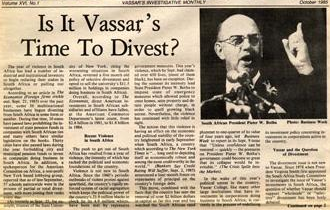If you had the power to prevent droughts, fires, flooding, global food shortages, and the displacement of environmental refugees, would you?
Scientists have come to consensus: greenhouse has emissions are changing our climate, and with these changes come extreme weather, food insecurity, and health impacts. As a direct result of climate change, impoverished communities being displaced from their homes by the millions. If every dollar we spend is a vote for how we want the world to be, the same is true for our investment dollars.
Your investment dollars are financing activities that cause droughts, fires, flooding, global food shortages, and environmental catastrophes—what will you do?

Natural disasters caused by climate change. Map created by wikimedia commons user KVDP
Canada’s economy is strongly tied to petroleum, natural gas and coal—we’re one of the largest per-capita emitters of greenhouse gases in the world. Our investment in a fossil-fuel economy has an impact: our investment dollars, and our government’s subsidies are endorsing a system that leads to extreme weather, to global food shortages, to the inability of the poorest populations to live safe and happy lives. Every dollar we invest not only impacts our financial future, but future generations.
“If you owned fossil fuels in your investment portfolio, it became increasingly clear to foundations that [you] own climate change,” says Ellen Dorsey, who is leading a divestment movement among community foundations. Any efforts that we make as individuals or organizations to combat climate change and its impacts are undermined by our investment in a fossil fuel economy that is causing them.
Economics drive policy. By withdrawing our investment in the fossil fuel economy, we remind companies, lobbyists, and political leaders that we care about long-term security over short-term gains, that we refuse to endorse economic policies that destroy natural systems and undermine global security. We vote for a livable planet.

Vasser College student newspaper’s coverage of the disinvestment from South Africa campaign
“Divestment is targeting the one thing that [fossil fuel] companies can’t buy, which is their reputation,” Jay Carmona of 350.org explains. In the 1980’s, withdrawing investment from apartheid-era South Africa brought attention to the moral cost by increasing the financial cost of operating within that system. In 2014, the divestment movement is seeking to do the same with the fossil fuel economy.
By voting with our investment dollars, we can influence policy that takes responsibility for our economy’s impact on climate change and its disastrous effects. We can make an impact.
Divestment is a kind of financial boycott. It’s a collective action that can take away the “social license” of the fossil fuel companies. It’s a way to change the conversation and it’s a vote for action.
More reading:
- Suffering the Science: Climate Change, People and Poverty
- Greenfaith.org’s Analysis, Study and Discussion on Divestment and Reinvestment
- INFOGRAPHIC | UN climate change report: What the Intergovernmental Panel on Climate Change says about the state of our environment
- Money is an instrument of moral choice
- Dutch bank refuses to invest in shale gas extraction
